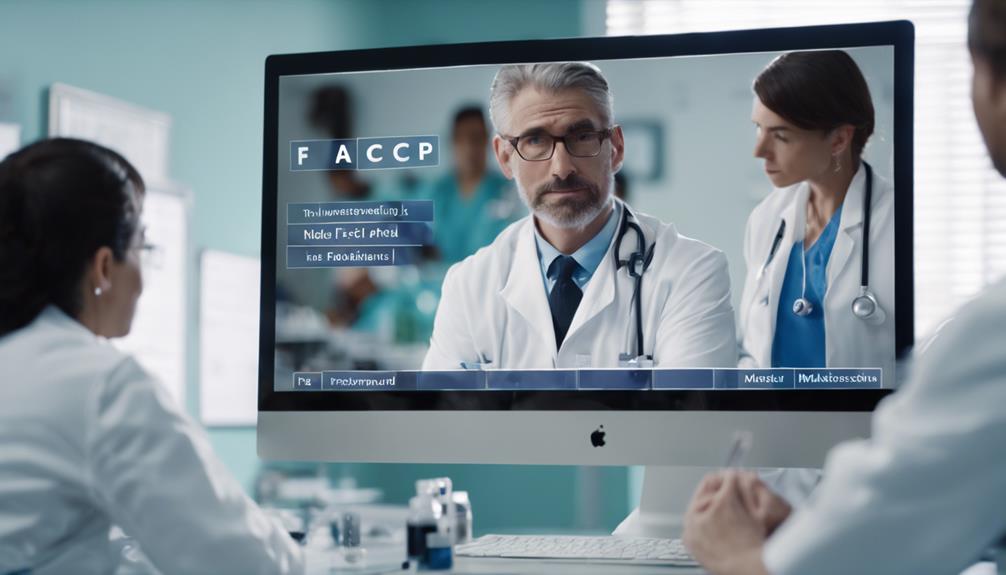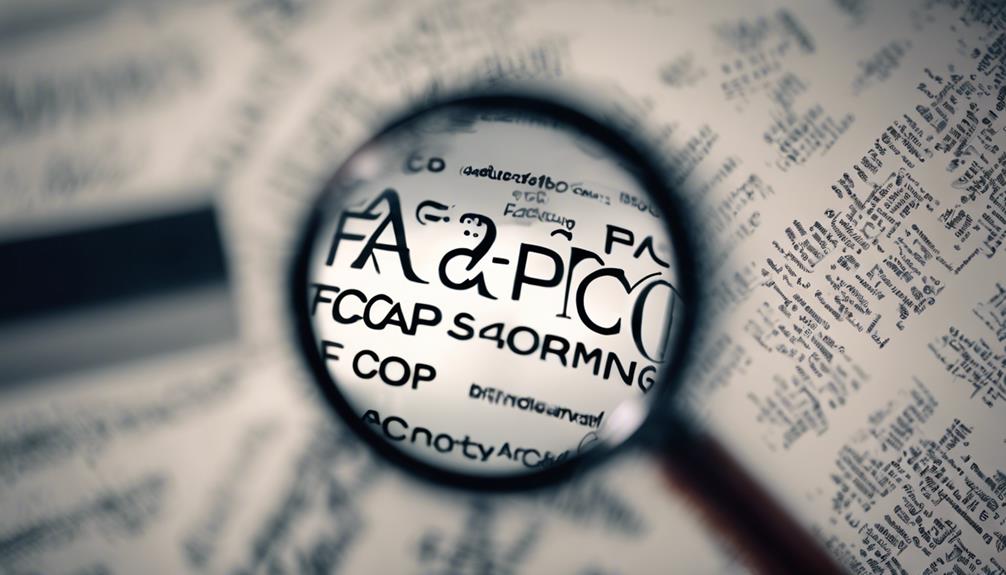Decoding the acronym FACP reveals its meaning as a prestigious title granted by the American College of Physicians. It celebrates exceptional practitioners in internal medicine, emphasizing dedication to ongoing learning, high-quality patient care, and valuable contributions to healthcare. The designation signifies a commitment to excellence in the medical field. If intrigued by the insights shared so far, further details about its history, application process, benefits, and distinction from other medical fellowships await discovery.
Key Takeaways
- FACP stands for Fellow of the American College of Physicians.
- It signifies excellence in internal medicine practice.
- The designation reflects ongoing commitment to patient care.
- FACP recognizes outstanding contributions to healthcare.
- Achieving FACP status demonstrates dedication to continuous learning.
History and Origin of FACP

The history and origin of FACP can be traced back to the founding of the American College of Physicians (ACP) in 1915. It was during this period that the fellowship designation, FACP, was established to honor exceptional physicians specializing in internal medicine. The creation of this distinction marked a significant milestone in recognizing the expertise and ethical standards of medical professionals.
Over the years, FACP has evolved to become a prestigious credential that signifies a commitment to continuous learning and excellence in patient care. Physicians awarded with this title have demonstrated outstanding contributions to healthcare, education, and medical practice. The FACP designation has become synonymous with dedication to the ever-evolving language of internal medicine, embodying a high level of proficiency and a deep-rooted passion for the field.
Being recognized as an FACP is a reflection of the hard work and dedication of physicians who strive for excellence in their practice, making valuable contributions to the advancement of internal medicine.
Eligibility Criteria for FACP

Exploring the requirements for attaining the esteemed FACP designation sheds light on the stringent qualifications expected of physicians in the field of internal medicine. To be eligible for FACP, candidates must have completed residency training in the U.S. and possess a minimum of three years of post-residency experience.
Additionally, holding an active medical license in the U.S. is crucial. Candidates must also be actively practicing in either an office or hospital setting. Making sure that membership dues are up to date is a key requirement for maintaining FACP eligibility.
These criteria are in place to uphold the high standards of the FACP designation and to ensure that those who hold this title are experienced, dedicated, and actively involved in the field of internal medicine. Meeting these eligibility requirements demonstrates a commitment to excellence in patient care and a deep understanding of the complexities of internal medicine.
Benefits of Attaining FACP

Attaining FACP signifies a commitment to excellence in the practice of internal medicine. The benefits of achieving this designation include:
- Enhanced Professional Reputation: FACP status demonstrates dedication to high standards of patient care, enhancing credibility among peers and patients.
- Distinguished Recognition: Being an FACP distinguishes individuals in the medical field, setting them apart as experts in internal medicine.
- Networking Opportunities: FACP membership opens doors to valuable networking opportunities within the medical community, fostering connections for collaboration and professional growth.
FACP Vs. Other Medical Fellowships

Comparing FACP to other medical fellowships reveals distinct focuses on specialty areas and professional development. FACP is unique to internal medicine, denoting expertise in this specific field. Unlike some fellowships that concentrate on research or sub-specialties, FACP emphasizes thorough standards of medical practice and continuous learning.
Awarded by the prestigious American College of Physicians, the FACP designation recognizes physicians for their healthcare contributions and dedication to excellence. The FACP fellowship places a strong emphasis on clinical experience, ethical standards, and commitment to patient care within internal medicine.
This distinction sets FACP apart from other fellowships by highlighting the importance of thorough clinical skills, ethical conduct, and patient-centered care. Physicians pursuing FACP are driven by a passion for internal medicine and a commitment to advancing their professional knowledge and skills in this specialized area.
Examining the FACP Application Process

To understand the requirements and steps for applying to the FACP Fellowship, applicants must submit a thorough packet at least one month before the deadline. When preparing your application, keep in mind the following key points:
- Sponsorship Letters: Two sponsorship letters from fellows or masters of the American College of Physicians are essential for your application. These letters demonstrate your commitment to the field and support from established professionals.
- Support Letters: Seeking additional support letters from colleagues or supervisors can strengthen your application. These letters provide a well-rounded view of your qualifications and dedication to internal medicine.
- Seek Guidance: Don't hesitate to reach out to the local ACP Governor or email FACP for assistance during the application process. Their guidance can clarify any doubts and help you navigate the application with confidence.
Importance of FACP in Career Development

FACP plays a vital role in career development by offering career growth strategies and enhancing professional skills.
This designation signifies dedication to continuous learning and improvement in patient care, making physicians with FACP credentials highly sought after in the healthcare industry.
Holding the FACP title not only boosts one's professional reputation but also opens doors to valuable networking opportunities within the medical community.
Career Growth Strategies
Enhancing career growth and development, the FACP designation plays a crucial role in signaling commitment to excellence in the field of internal medicine.
- FACP designation enhances credibility and career prospects, setting individuals apart in the medical community.
- It showcases a dedication to continuous learning, ethical patient care, and overall excellence in medical practice.
- FACP members have access to a network of esteemed professionals, opportunities for ongoing medical education, and avenues for professional growth.
The FACP credential not only demonstrates excellence but also requires individuals to meet rigorous standards, ensuring they stay at the forefront of medical advancements and maintain the highest level of patient care.
Professional Skills Enhancement
Professional Skills Enhancement through the FACP credential boosts a physician's reputation and credibility in the field of internal medicine. Attaining the FACP designation showcases a dedication to ongoing learning and enhancing patient care.
Membership in FACP provides avenues for networking and collaboration within the medical community, fostering professional growth. Physicians with FACP are highly regarded for their expertise in internal medicine and adherence to ethical standards.
The FACP credential signifies a commitment to upholding elevated standards of medical practice and delivering excellence in patient care. Holding this designation serves as proof of a physician's proficiency and commitment to advancing their skills, making them a sought-after professional in the field of internal medicine.
FACP: A Symbol of Excellence

FACP is a badge of honor, a symbol of medical excellence that showcases a physician's dedication to exceptional healthcare standards.
It embodies a commitment to quality, serving as a beacon of superior medical practice and ethical values.
With FACP designation, physicians aren't just recognized but revered for their contributions to the field of internal medicine.
Symbol of Quality
When a physician earns the FACP designation, it signifies a commitment to maintaining high standards of medical practice and continuous education. The FACP credential serves as a symbol of excellence in internal medicine, showcasing a dedication to providing top-tier patient care. Achieving the FACP designation reflects not only professional achievement but also a physician’s dedication to staying current with advancements in medical science. Much like understanding the meaning of ‘CR’ on road signs denotes a comprehension of essential road safety, the FACP credential indicates a deep understanding of clinical excellence in internal medicine. Both require continuous learning and an attention to detail that ultimately benefits the public.
Physicians with FACP are esteemed for their expertise and valuable contributions to the healthcare field. Holding the FACP title not only enhances one's professional reputation but also opens doors to networking opportunities and collaborations within the medical community.
This prestigious designation is a hallmark of quality, representing a physician's ongoing pursuit of knowledge and proficiency in delivering exceptional medical services.
Excellence Emblematic
Embodying a dedication to superior medical practice, the FACP designation stands as a beacon of excellence in the field of internal medicine. Awarded by the American College of Physicians (ACP), FACP signifies a commitment to high standards of medical care and continuous professional development.
Physicians with FACP are recognized for their expertise, ethical standards, and contributions to healthcare. Attaining FACP fellowship distinguishes individuals as leaders in the field of internal medicine. This prestigious designation not only acknowledges the individual's accomplishments but also highlights their ongoing dedication to providing exceptional care to patients.
FACP serves as a symbol of excellence that showcases a physician's commitment to advancing their skills and knowledge in the ever-evolving field of internal medicine.
Signifying Superior Standards
Moving from the domain of recognition to the domain of exemplification, the FACP designation serves as a definitive symbol of excellence in the field of internal medicine. Achieving this prestigious credential signifies a physician's unwavering dedication to upholding high standards of medical practice and prioritizing continuous education in the field of internal medicine.
Physicians with FACP designation not only showcase their exceptional expertise but also contribute greatly to the advancement of healthcare. Holding the FACP credential elevates a physician's professional standing, enhancing their reputation and credibility among both peers and patients.
Additionally, physicians with FACP designation embody ethical standards and excellence in their medical practice, setting a benchmark for superior standards within the medical community.
Maintaining FACP Status

Maintaining FACP status necessitates physicians to actively engage in ongoing professional development activities and meet the designated requirements set forth by the American College of Physicians.
Continuous learning and participation in the medical community are essential for retaining this prestigious designation. Physicians with FACP status must stay up to date with advancements in medicine through continuing education.
Additionally, periodic assessments or evaluations may be necessary to guarantee that members uphold the high standards associated with the FACP designation.
FACP and Continuing Medical Education

Engaging in continuing medical education is essential for physicians holding the FACP designation to remain current in their field. Continuing Medical Education (CME) plays a crucial role in ensuring FACP members stay abreast of the latest advancements and best practices in internal medicine. Here are three key points highlighting the significance of CME for FACP professionals:
- Requirement for Maintenance: FACP requires physicians to complete a specified number of CME credits regularly to uphold their designation and demonstrate a commitment to ongoing learning.
- Staying Updated: CME activities enable FACP members to stay informed about new medical technologies, treatment protocols, and research findings, enhancing their ability to provide high-quality patient care.
- Professional Development: Engaging in CME not only helps maintain FACP status but also fosters continuous professional development, reflecting a dedication to excellence in the practice of internal medicine.
FACP: Recognizing Achievements

Recognizing achievements in internal medicine, the FACP designation signifies a physician's exceptional expertise and dedication to high standards of medical practice. Awarded by the American College of Physicians, this prestigious credential highlights a physician's commitment to upholding top-tier medical standards.
Physicians with FACP demonstrate a dedication to ongoing education and making significant contributions to healthcare. The FACP designation not only acknowledges a physician's accomplishments but also boosts their professional reputation and credibility within the medical community.
Holding the FACP credential is a testament to a physician's continuous pursuit of excellence in the field of internal medicine. It serves as a mark of distinction, showcasing a physician's proficiency, commitment, and unwavering dedication to providing exceptional care to patients.
Achieving FACP status is a notable milestone that sets physicians apart as leaders in the medical profession, recognized for their exceptional skills and unwavering dedication to advancing healthcare practices.
Frequently Asked Questions
What Does FACP Stand For?
FACP stands for 'Fellow of the American College of Physicians.' It's a prestigious title that highlights expertise in internal medicine and a dedication to high medical standards. This designation boosts a physician's professional reputation and credibility.
ACP awards the FACP title based on specific criteria, including clinical experience and ethical standards. Physicians with FACP recognition are esteemed for their contributions to healthcare and ongoing education.
What Is FACP the Acronym for Electrical?
FACP in electrical engineering refers to 'Field-Effect Transistor (FET) Common-Source Amplifier with Source Degeneration.' This circuit setup amplifies electrical signals in devices by controlling gain, impedance, and stability.
Understanding FACP is vital for optimizing amplifier performance. An interesting fact is that FACP is a common acronym encountered in electronic circuit design and analysis.
Mastering FACP is essential for anyone delving into electrical engineering to create efficient electronic devices.
What Does FACC and FACP Mean?
FACC and FACP are prestigious designations for physicians. FACC stands for 'Fellow of the American College of Cardiology,' highlighting expertise in cardiology. FACP represents 'Fellow of the American College of Physicians,' showcasing excellence in internal medicine.
Both titles signify dedication to high standards of practice and continued learning in their respective fields. Physicians with these designations are esteemed for their contributions to healthcare and commitment to patient care.
What Is FACP Credentials?
FACP credentials indicate a physician's fellowship status in the American College of Physicians. This designation showcases a dedication to high medical standards and ongoing learning. Physicians with FACP credentials are esteemed for their expertise in internal medicine.
Attaining this recognition can elevate a physician's professional standing and provide networking opportunities. Membership in FACP reflects a commitment to ethical practices and excellence in patient care.
Conclusion
To sum up, attaining the FACP designation is a significant milestone in a physician's career, symbolizing expertise and dedication to patient care.
Just like a beacon shining in the dark, FACP illuminates the path to excellence in the medical field.
With rigorous standards and ongoing education requirements, FACP holders continue to aim for greatness, setting a benchmark for others to follow.









